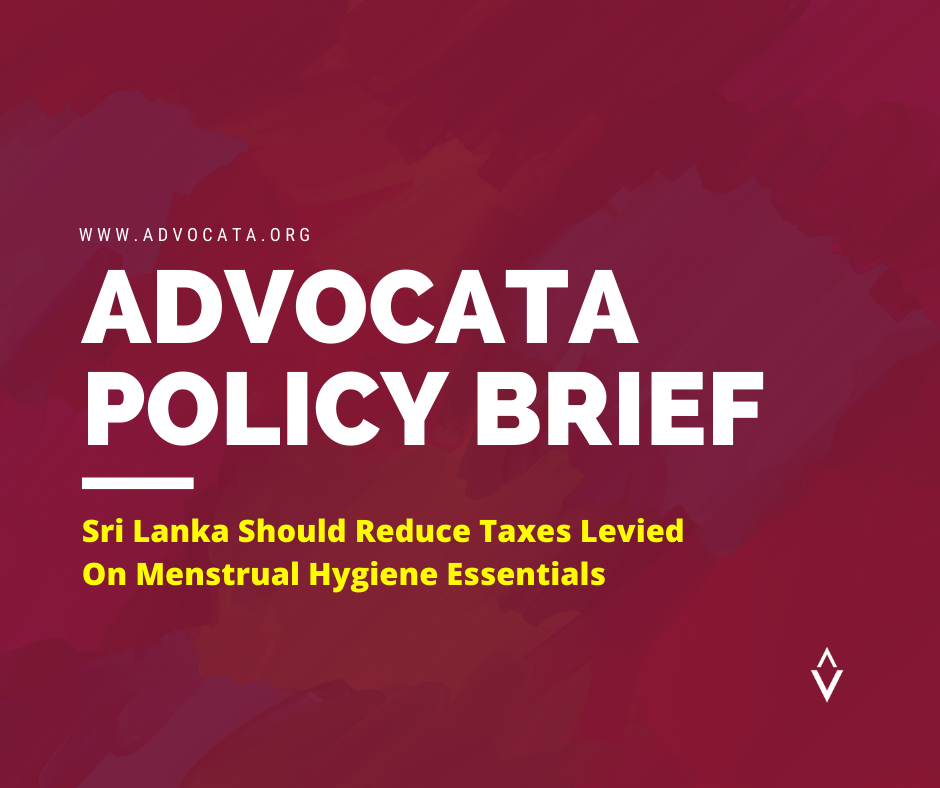Originally appeared on Daily FT, Ceylon Today, The Island and Daily Mirror
By Anuki Premachandra
Today (28) is Menstrual Hygiene Day. Most of you might not be aware of it because in Sri Lanka, we pretend that women don’t bleed.
Poor menstrual hygiene is caused by a lack of education on the issue, persisting taboos and stigma, limited access to hygienic menstrual products and poor sanitation infrastructure that undermines the educational opportunities, health and overall social status of women and girls around the world. As a result, millions of women and girls are kept from reaching their full potential.
In Sri Lanka, we treat access to menstrual products as both a luxury and a black market good. Steeped in social stigma, the negative characterization of these necessities have overwhelmingly resulted in a growing prevalence of ‘Period Poverty’.
Period Poverty isn’t just another term
Period Poverty refers to having a lack of access to sanitary products due to financial constraints. This problem is quite serious in the case of Sri Lanka. Commercially produced sanitary towels typically sell between Rs. 120-175. Imported brands can go up to Rs. 350, putting them out of reach for most women, thereby making it a luxury for some.
The heavy tax on sanitary napkins is a key contributor to these disproportionately high prices.
In September 2018, the Minister of Finance reduced the tax on sanitary napkins to 62% from 102%, following the removal of the CESS tax. The Minister for Finance Mangala Samaraweera recently mentioned in a Reuters article that he was looking at ways to reduce the tax further as he recognises the effect of period poverty on girl’s school attendance and the participation of women in the economy.
The average woman has her period for 2,535 days of her life. That’s nearly seven years of depending on unhygienic cloth rags and makeshift solutions if sanitary napkins are beyond your financial reach.
This is a classic characteristic of a luxury good. Expensive watches or perfumes are only within the purchasing power of some, because only they are rich enough to afford it.
Unfortunately sanitary napkins have fallen to the same misfortune. Is it justifiable that something so essential as a pad is something that only those with financial capacity can afford?
This year’s tagline is ‘Menstruation Matters’ and could not be more relevant to Sri Lanka. A few weeks ago, a Sunday newspaper ran an article on urbanisation that expressed views on how the ‘modern’ woman buys sanitary napkins in this country – indeed, a round peg in a square hole. Nonetheless, it is interesting to analyse the thinking behind this narrative.
The writer explains how women in modern society now purchase their sanitary napkins in broad daylight over supermarket counters, instead of the sanitary napkins being sold wrapped in newspaper or brown bags in efforts to hide the identity of the product. There is clear disapproval of purchasing sanitary napkins out in open!
Unfortunately, the ideal transaction etiquette the writer holds dear is more common in Sri Lanka than we’d like to accept. A few weeks ago, when I purchased a packet of sanitary napkins in Kandy, the grocery uncle went to great lengths to wrap my purchase up in newspaper, because god forbid if someone finds out I’m on my period, right? Some blame culture, some blame our values – but the result of this stigma is the imminence of ‘Period Poverty,’ which 10.5 million women in our country are burdened with.
How does stigmatising our periods aggravate Period Poverty?
This little charade of hiding your pads and the norms which reinforce this act makes it almost seem like you’re buying a boxful of heroin, and not pads.
Treating a product this essential like you would a good sold in the black market means that the social stigma around periods extends to the purchase of sanitary napkins.
The stigma is so strong that stores don’t sell the product without masking its identity, women don’t openly discuss the purchase of this product, leading us to accept the product as it is, without questioning its price or quality merely due to the lack of open conversation. We’re made to accept whatever that is sold to us – at a higher price and with little variety.
The local sanitary napkin market is dominated in Sri Lanka by a few brands. The protection of these brands is also why there is such a huge tax on the imports. When compared to supermarket aisles in India, Sri Lankan aisles carry very limited variances of the product.
The demand for specific types of sanitary napkins differ from woman to woman – our physiologies are different. We barely see pads that are for example, organic cotton, washable and reusable, etc. in our aisles because when we treat pads as a black market product, we’ve put ourselves in a situation where we’ve just got to accept whatever that is available in our reach!
No, your pads are not a packet of drugs whose identity needs to be masked and sealed. No, it is not fair that pads are made expensive (through taxes and very minimal competition) to the point that only a selected few can afford them.
This Menstrual Hygiene Day, I urge you to start having open conversations about issues of this nature. We need to change this narrative. Pads should not be a luxury. Period.
View this article in Sinhala here.



